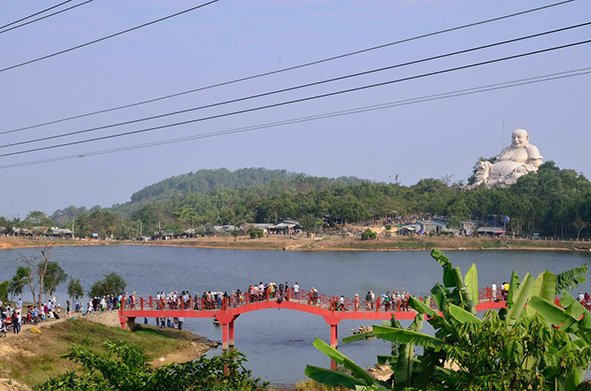
That Son or Bay Nui (Seven Mountains) region spans Tri Ton and Tinh Bien districts of the Mekong Delta province of An Giang bordering Cambodia. The region is endowed with many historical and cultural relics as well as stunning landscapes, so we have decided to make a journey to explore its cultural charm and natural beauty.
That Son or Bay Nui (Seven Mountains) region spans Tri Ton and Tinh Bien districts of the Mekong Delta province of An Giang bordering Cambodia. The region is endowed with many historical and cultural relics as well as stunning landscapes, so we have decided to make a journey to explore its cultural charm and natural beauty.
 |
| People walk on a bridge to get to Phat Lon Pagoda in Cam Mountain |
Before reaching Bay Nui, we have to conquer Ba The Mountain. The mountain, about 200 meters above sea level and by the poetic Thoai Ha River, is home to many species of monkeys, squirrels and herons as well as wild birds.
For pilgrims and architecture enthusiasts, Linh Son Co Tu Pagoda, Phan Thanh Gian Temple at the foot of the mount or Son Tien Tu Pagoda on its peak will offer elegant architecture as well as a peaceful and tranquil atmosphere. Some more things Ba The can feast tourists are Ong Ho and Ong Chot Ta caves where locals worship the goddess of mountain and tourists can find out masterpieces of nature.
Thach Cha Ra, an elderly man who has been in Oc Eo Town, Thoai Son District for over 70 years, shares that he does not know when the name of Bay Nui was born but he has heard many folklores and enigmatic stories about the region that cannot be verified until now. He says the seven mountains namely Nuoc, Nam Gieng, Co To, Ket, Dai, Cam and Tuong are linked together into an arc.
Many ways to go to Bay Nui are surrounded by the ever green rice fields and water coconut farms with many pagodas and temples being scattered in between.
Co To Mountain appears dimply before our eye when we get closer to Tri Ton Town. The smell of fish starts reaching our nose as we can see tra fish being dried under the sun, which is a specialty of the region.
We continue the trip to Chau Doc Town where we find many fruit called ‘tram’ ripening in a vast color of purple and many water coconut trees as well as Khmer pagodas along the road. Even it is a bit late in the afternoon, many tourist groups gather at the foot of Cam Mountain to admire and say their prayers at Asia’s highest Maitreya Buddha statue measuring up to 38 meters.
Among seven mounts, Cam seems to be the most popular as it attracts a large number of tourists and pilgrims every day. Therefore, the fragrance of incense overwhelms the mountain and the trading ambiance is also busy along the way from the foot to the peak. The path is rather steep so we ask motorbike drivers to take us up to the top. Well, their riding can be likened to a very amazing performance of stuntmen.
When the sunset comes over the region, a giant rock in a shape of a parrot on Ket Mountain impresses us. That giant rock is a unique feature of An Giang. In the distance, Nha Ban Township is still kept busy with vehicles on streets even at dusk.
Touring to Bay Nui, no matter in the past or today, people often hear mysterious stories about fairies and goddesses. Bay Nui today is the home to ethnic groups of different religions from Buddhism, Caodaism, and Catholics, creating a mixture of cultures. Each year, the region witnesses many traditional festivals of Kinh and Khmer people, giving a chance for the community and other younger generations to practice and keep the tradition and old cultural values.
Along with thot not (water coconut), which is a local specialty to serve tourists and to help local residents earn more income, people in Bay Nui now develop other crafts like making thot not sugar and weaving brocade.
People to Bay Nui today have no chance to see horse carts but modern facilities and vehicles. More houses are built, more power poles go up, more pagodas are renovated and more roads are upgraded, promising a bright future for local living standards and tourism potential of the region.
(Source:SGT)



